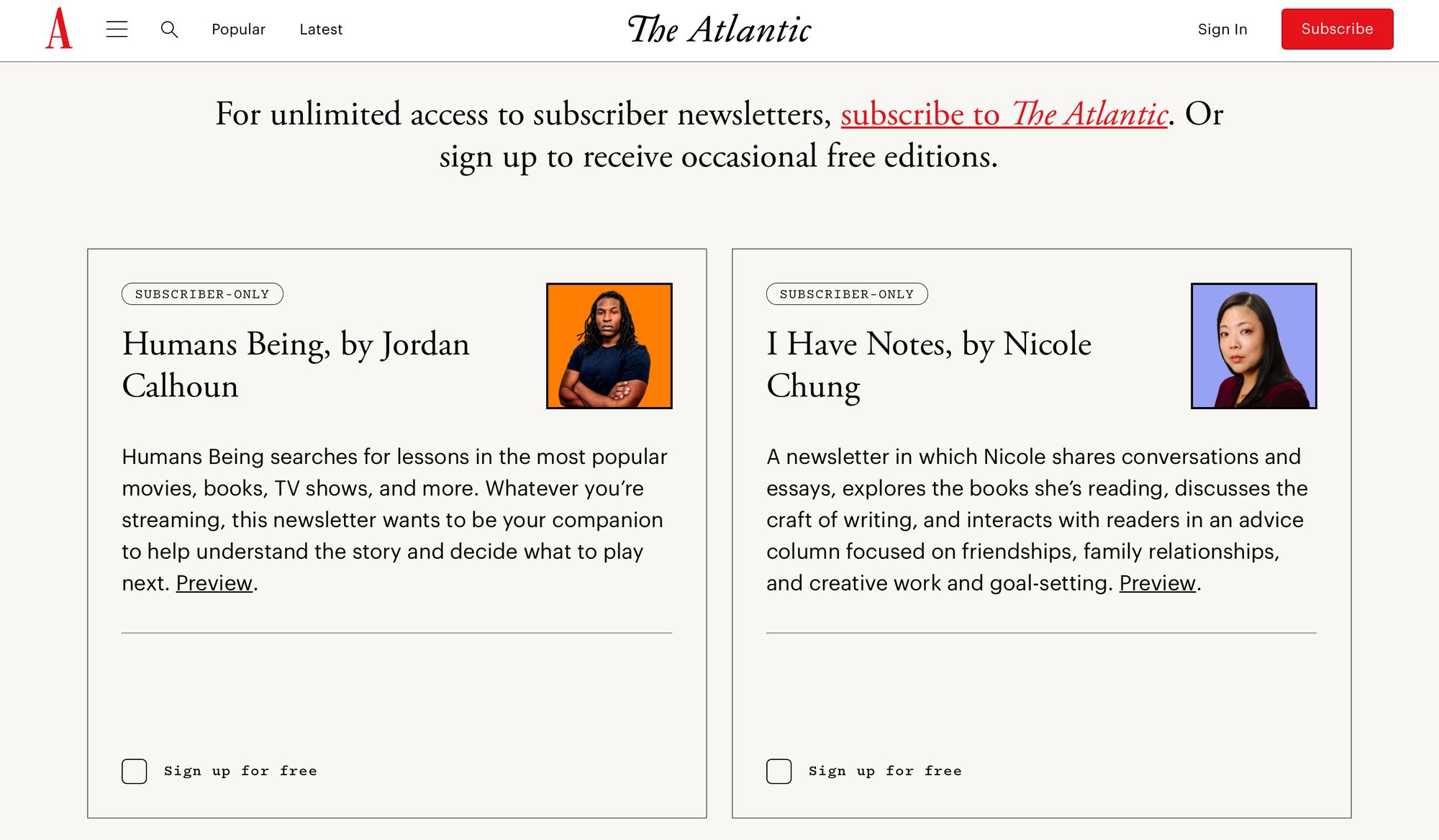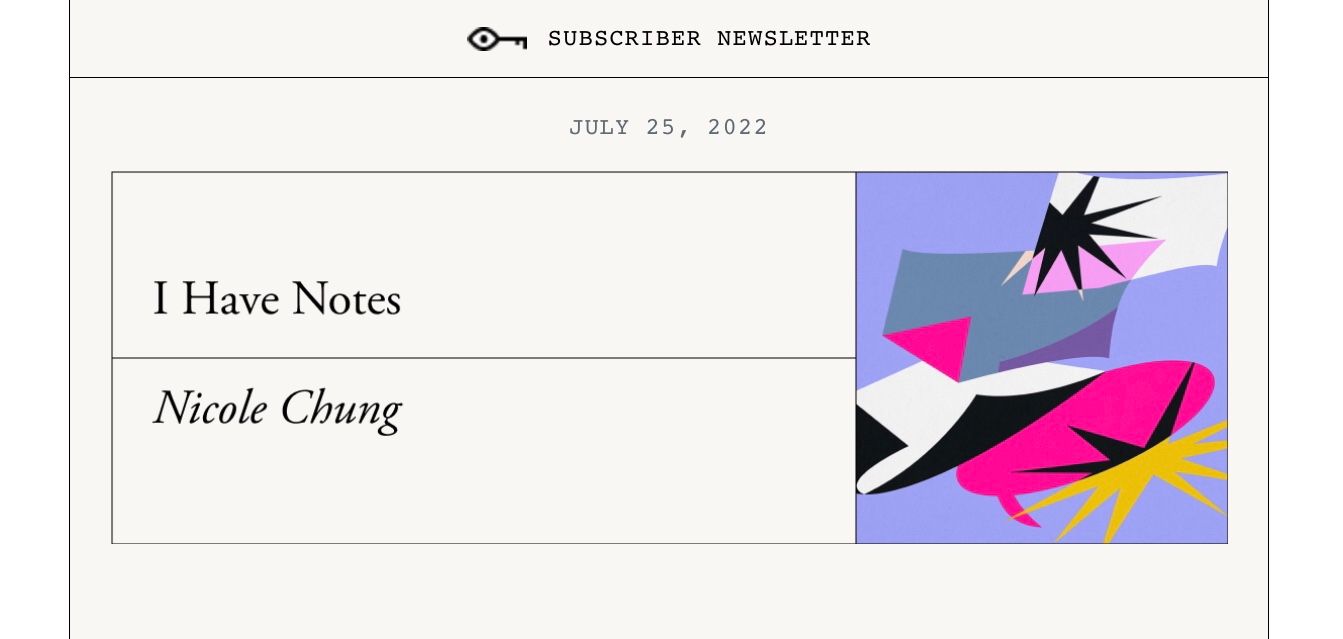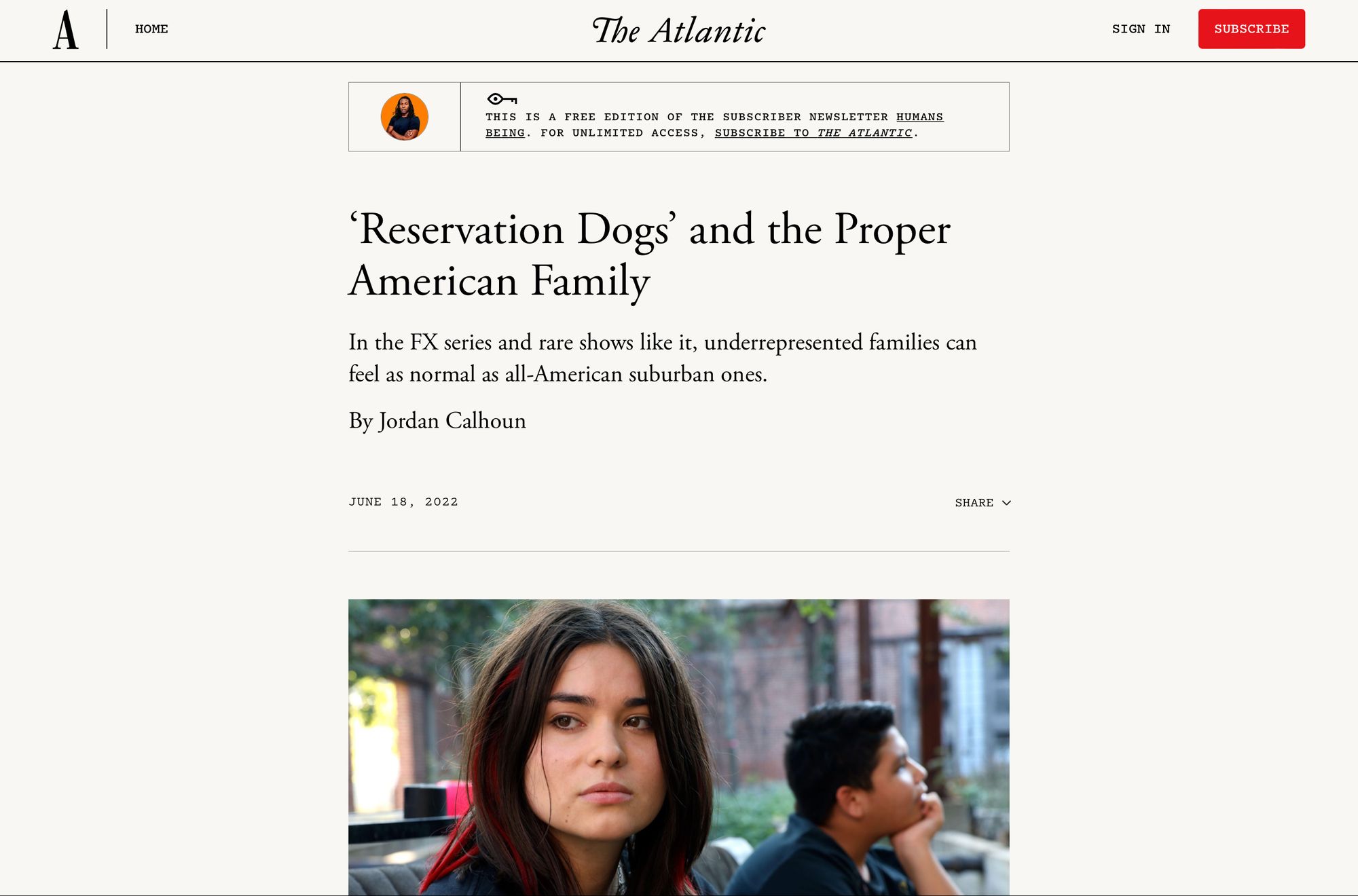
Outpost built and developed a network of newsletters for The Atlantic, featuring writers such as Imani Perry, Molly Jong-Fast, David French, and Charlie Warzel. This network, known as The Atlantic Subscriber Newsletters, works with The Atlantic's existing infrastructure and helps drive new subscriptions to The Atlantic.
The Challenge:
The Atlantic wanted to create a set of newsletters featuring a diverse set of creative voices that was simple for both writers and readers to use.
The project's goal was twofold: one, get non-Atlantic subscribers subscribing to one or more free editions of the newsletters as an entry point to subscribing to The Atlantic and two, give Atlantic readers the additional benefit of being able to subscribe to great and largely unfiltered writing from great writers.
The project was seen as a way for The Atlantic to tap into the newsletter zeitgeist--albeit with their own spin on it and return in some senses to the best of the early 2000s blog culture.
The Atlantic expected this to be a high profile launch, and it was. It drew media coverage pre-launch based on shards of information prior to the launch, and wide industry coverage at launch. The project was launched publicly on November 2, 2021 with an announcement from Jeffrey Goldberg, The Atlantic's Editor-in-Chief about "this great experiment."
As astute observers of the Discourse know, newsletters have arisen to fulfill at least some of blogging’s salutary functions. Newsletters are conversational, unrehearsed, contingent, revelatory, humble, and entertaining, and journalism can always use more of these qualities. The Atlantic, which is already home to writers with clashing worldviews and original ways of seeing what is (as a great writer who didn’t have a newsletter once said) too often right in front of our noses, is always keen to showcase for our readers new writers, and new kinds of writing. Growing our family of newsletters dramatically seemed like one good way to better serve our readers. And so I’m very pleased to introduce to you nine new newsletters from The Atlantic, all from people we think are among the most interesting writers in America.
Requirements:
The Atlantic had very specific requirements for this "great experiment":
- The newsletters needed to work with The Atlantic's existing subscription system, so that paying subscribers to The Atlantic would be upgraded to paid privileges and have them removed if their subscription lapsed;
- The Atlantic's login system, not Ghost's native system, needed to be used to determine reader privileges, including whether a reader could view a paywalled post on the web;
- the sites all needed to run on an Atlantic subdomain, with each site in a subdirectory,
- the 9 sites needed a shared theme, specced by The Atlantic's talented design team, that could be easily updated across all nine sites;
- The Atlantic needed to integrate their existing caching, data and email systems with the subscriber newsletter system;
- The Atlantic also had very specific design requirements for both transactional emails and newsletter emails, including the ability to insert ads into newsletter emails dynamically;
- Readers needed to be allowed to subscribe from multiple locations, including The Atlantic's account pages, a multi-select landing page hosted by The Atlantic, and on the individual newsletter sites;
- Readers who subscribed from account pages or a multi-select page should only have to confirm their email address once, or not at all, if they were known Atlantic users;
- The Atlantic needed the newsletters' infrastructure to be hosted for them, including a dedicated staging environment;
- The Atlantic needed to control the email system that would send out the newsletters.
Why Outpost:
After a few months of talking with many of the major players in email newsletter industry, The Atlantic decided to work with Outpost to build this custom this system on Ghost, the open-source content management system that Outpost's software supports.
Outpost had previously moved over two high-profile publications to Ghost from Substack, namely the David Sirota-founded Lever News (previously known as the Daily Poster) and Isaac Saul's Tangle. We knew Ghost well, and had a team with a track record of building innovative editorial tech.
After a number of discussions, meetings and proposals, The Atlantic chose to partner with Outpost, using a modified version of Ghost, as that was the only way to build this project quickly and cleanly, while meeting all requirements.
Other options such as centralized and closed platforms did not offer enough control or flexibility to meet the project's needs. Legacy CMSes like WordPress are quite complicated when it comes to newsletter-first, subscription-driven publications, and have tedious editorial workflows for those kinds of publications.
The Timeline:
Outpost had ~6 weeks from agreement to public launch, due to business and contract-driven deadlines. (Yes, six weeks).
The Building Process:
In a very short timeframe, Outpost pulled together a dedicated team to work on the three main challenges:
One, build a custom Ghost theme that adhered to the meticulous (and quite lovely) designs from the Atlantic's design team;
Two, modify Ghost and Outpost's software to work with the Atlantic's membership system and the design needs for the newsletters's emails to readers; and
Three, create a robust, secure and easily updated hosting infrastructure that also accommodated the Atlantic's existing data systems.
Due to the fast pace and interoperability requirements, we had to work closely with a wide swath of the Atlantic's talented teams including the editorial, data, engineering, QA, and marketing teams. We set up daily stand-up meetings, collaborated on Slack, and shared our ticketing environment.
The Product:
Outpost delivered the product as specced, on time, with even a few days for final QA, leading to a successful, high-profile launch that was profiled in Axios and became the discussion du jour on Media Twitter.

In just six weeks, we built all three key prongs.
That included an all new hosting environment, based off Terraform, that allows us to quickly deploy, update and if need be, destroy all nine sites, the associated databases and the secure external connections to the system. We also built a parallel staging environment where new features can tested and QA-ed.
We built, with the help of Biron Themes, a single custom Ghost theme with localized variables that powers all of the sites. This lets us make a change in one theme and then deploy the changes across the network in seconds, with no downtime.

And in the backend, we built all the connecting pipes, including the ones that made sign-up smooth for both subscribers to The Atlantic and those that we hoped soon would become subscribers. All of the data pipelines were in place on day one, and the attention online brought in tens of thousands of subscribers to the newsletters in the first week alone.
Additionally, since several of the Atlantic's requirements could not be met with the vanilla version of Ghost, we had to make some changes to Ghost's core code. This was a heavily debated decision, which was made jointly by Outpost and The Atlantic.
This was especially difficult decision to make since Ghost's engineering team moves incredibly fast and sometimes introduces breaking changes in new versions.
So we had to be very thoughtful about what changes to make and where to make them in the codebase. That's because we need to keep the Subscriber Newsletters as close as possible to the latest version of Ghost. Doing so ensures that both the editorial team and the project as a whole gets the benefits of new features and keeps the site secure.

All changes we made to Ghost are open-source, and can be seen in The Atlantic's Github repository.
Building this on such a short timeline required outsized contributions from Outpost's core team and outside collaborators, including the countless hours and vision from Tom McCarty, veteran help from Mike Zielonka, and the curious eyes and steady advice from Raphaël Vinot.
Ongoing Support:
Outpost continues to host and support the Subscriber Newsletters. We build incremental features for the system, including design updates, technical updates, and collaboration on new ways to meet the project's business goals.
If you are interested in talking with Outpost about building a custom solution for your project, please email us at info@outpost.pub.
